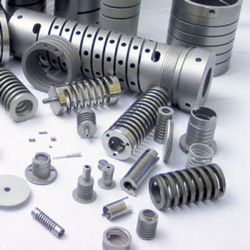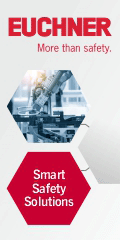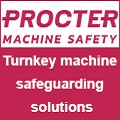
Posted to News on 26th Jul 2016, 11:05
How machined springs out-perform wire-wound springs
Simon Cattle of Abssac outlines some of the ways in which the unique benefits of machined springs can be used.

Design engineers are discovering the many benefits that machined springs provide within demanding applications. Developed from the concept of incorporating the versatile Heli-Cal Flexure into a single piece of material with end attachments, machined springs can accommodate load cases such as: compression, extension, torsion, lateral bending, lateral translation and more.
For more than 30 years Abssac has been providing machined springs to such industries as aerospace and aviation, medical tools and equipment, defence and renewable energy, as well as computer and semiconductor manufacturing and many other demanding applications. The product has been widely used to solve the most difficult requirements; Abssac's engineers have expertise in designing and manufacturing machined springs from specialist alloys including Inconel, titanium, stainless steel, and high-strength alloys such as MP35N, Custom 455 and C300.

Because machined springs are always manufactured for a specific application and purpose, there are no stock machined springs. Applied to either high-precision applications or commercially graded needs, the versatile machined spring provides superior elastic performance in a wide variety of applications. Machined springs can be designed to specifically address requirements for rate, reactions at desired deflections, combined rates, modal properties, weight, inertial limits, and more.
This application-specific approach facilitates an unusually good correspondence between what is desired and what is economically possible. Helical springs can also support such design objectives as reliability, repeatability and multiple part integration.
Load case: compression and extension

Another possibility with machined springs is combining a right-hand and left-hand flexure in a single piece to prevent the rotation that many types of springs exhibit during compression and extension. The ability to incorporate custom machined features as part of a single-piece elastic component makes machined spring an excellent choice for demanding applications.
Load case: torsion
Endless design options are possible with machined springs when applied to torsional load cases. Because attachment features can be integrated into a single-piece machined spring, the traditional challenges of how to transfer torque into a torsion spring are no longer a concern. It is now easier to use the versatility of integrated features to enable a pure moment to be created in the torsion spring application.
With linear rates and the potential for rate accuracies approaching one per cent, outstanding performance from machined springs can raise the product design above alternatives.
Load case: lateral bending and translation
Additional benefits of machined springs can be realised in applications beyond the normal compression/extension or torsion load cases. The engineering staff at Abssac can apply their expertise in engineered elasticity to spring designs involving lateral bending and/or lateral translation applications. Lateral bending is the result of anchoring at one end and applying a moment to the opposite end. Lateral translation occurs when one end of the spring is anchored and the other end has a force and moment applied in such a way that the ends remain parallel during displacement.
Leveraging the machined spring's ability to provide both predetermined elastic performance and integrated attachment features, all in a single-piece component, enables designers to benefit from significant advantages, all backed by the reliable and repeatable performance for which Abssac is renowned. The integrated attachments facilitate the anchoring of the spring and subsequent application of forces and/or moments with unprecedented ease. Changing the outside or inside diameters, as well as the number of starts, number of coils and coil width, make it is possible to provide the desired spring rates in different axes of displacement.
Follow the link for more information about machined springs. Abssac is currently offering a free demo box for engineers who wish to find out more about this unique product. Request this by telephoning +44 (0)1386 421005 or emailing [email protected] (please mention MachineBuilding.net).
Want the latest machine building news straight to your inbox? Become a MachineBuilding member for free today >>















